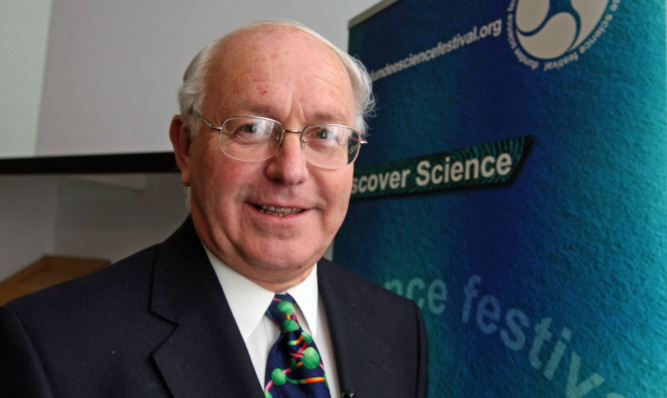One of the United Kingdom’s leading scientists fears Dundee University could suffer a damaging brain drain if the country votes for independence.
Professor Sir Philip Cohen said the risk of scores of its top scientists quitting for more securely funded research elsewhere could be very damaging for Dundee University, which has built a glowing reputation as one of Britain’s top scientific research centres.
He believes the major uncertainty over the future of funding for scientific research in higher education in the event of a Yes vote will worry the legions of top scientists who work on the banks of the Tay.
“These doubts could force them to quit for posts outside Scotland where funding is more secure, causing a brain drain that could be a big problem for Dundee,” he stated.
“This is serious for higher education in Scotland and it is serious for Dundee University,” stated multi-award winning scientist. “I don’t feel I can sit back any longer without speaking out. An awful lot is at stake with this vote next week – and I am not sure if the full implications on many fronts are fully understood.”
One of the UK’s most eminent biochemists set up Europe’s largest collaboration between academia and the pharmaceutical industry in Dundee to develop new drug treatments which span such global diseases such as cancer, rheumatoid arthritis and Parkinson’s.
It is part of the university’s College of Life Sciences which last year received funding of well over £100 million, 80% of which arrived from outside Scotland.
“A thousand scientists and support staff work in the college’s laboratories and thousands more in greater Dundee owe their positions to these scientists,” he explained.
“A lot of this money comes from the European research councils and I am astonished that this issue has not been discussed more seriously.
“European money goes to member states and we know that Scotland will not get into the European Union as Spain has said it will exercise its veto because it does not want to encourage its own home rule movements in Catalonia and the Basque region.
“Cutting off the millions of pounds that flow in from Europe would be a big issue for Scotland, and would be a big problem for Dundee University.
“The UK research councils are based in England and if there is Scottish independence there will presumably be separate ones for Scotland and the rest of the UK.
“Scottish universities at the moment get about 13% of the UK funding but have only 8% of the population. If funding is to be on a per capita basis the Scottish Government will have to substantially increase the per capita amount to replace the funding that Scottish universities presently receive.
“The SNP have said they understand this is a problem and that they will deal with it, but we don’t know how in the long term.”
He believes the research funding system in the UK compares well with other countries including the United States and Germany, and Dundee University performs well within the existing system.
The absence of details about how an independent Scotland would fund research is causing uncertainty to the profession and all who work in it, he stated.
“Another issue is the fact that scientific research can take a long time before results are achieved,” he continued.“The UK’s Medical Research Council has been in existence for 100 years and is an efficient organisation that performs well and brings a lot of experience to its activities.
“I worked away with funding from the MRC for 25 years without the pharmaceutical industry taking any notice of me, but thanks to the MRC’s support I have helped to develop our knowledge of kinase enzymes that have become the pharmaceutical industry’s most important drug targets and have led to many new cancer drugs.
“In an independent Scotland I think there would be a danger that the government would favour schemes and investments that would produce relatively quick economic returns.
“How high a priority would be given to fundamental scientific research that might take 25 years to come to fruition?”’Independence will protect universities’Professor Bryan MacGregor, a spokesman for Academics for Yes, said: “The simple truth is that Scotland does well in open competition for funds but poorly where funds are allocated by other means, such as for research council centres and private R&D.
“The Scottish Government is committed to proper funding of research and other benefactors will support quality research wherever it takes place.
“Charities already raise substantial funds in Scotland.On the one hand, we have the UK and England contexts of cuts in researchand science funding, high student feeswith unsustainable loan funding, animmigration policy that is preventing and deterring international student recruitment and the possibility of an exit from the EU and its research funding.
“And, on the other, we have a Scottish Government committed to funding research, to free access to universitiesfor residents and to attracting international students.Independence will protect Scotland’s universities and allow appropriate research priorities to be determined.”
